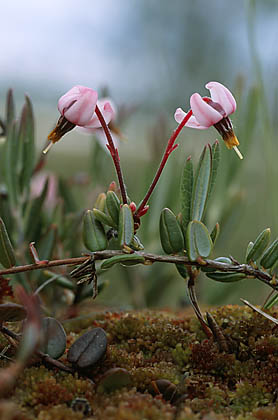Cranberries flowering in bogs
Photo: Arne Ader
Translation: Liis
Cranberry
Cranberry Harilik jõhvikas Oxycoccus palustris
In bogs the cranberry bushes are flowering. Is that a bush, berries hanging as if from horsehairs in autumn? Yet it is a creeping dwarf bush, with stems only a few millimetres thick. The young shoots are green, herbaceous and hairy. In the second year they lignify, becoming reddish-brown, and when even older, the bark on the stems becomes flaky as on many other bushes. The leaves are small, egg-shaped, with a bluish-white film on the undersides.
The pink, sometimes carmine red flowers have a diameter of up to a centimetre and can be in groups of up to four together; they are pollinated by bog-living insects with long mouth parts.
Cranberries enjoy the acid environment and the sun heat in the bare bog but dread drying out; the plants perish as a consequence of drying because they take all that they need for life from the water in the peat moss and from air. Life can be as frugal but yet fruitful as this too.









